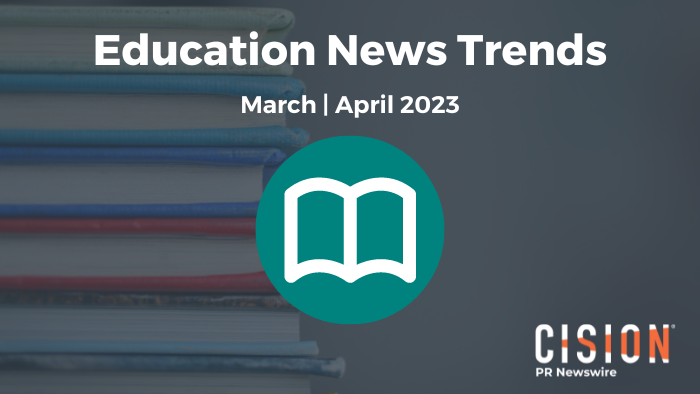AI, Student Mental Health, and More Education News Trends
A look at the education news from PR Newswire in March and April that you might have missed.

By Toney Palumbo | Published May 4, 2023
After poring through 1,741 education-industry press releases in March and April, our team has identified a few noteworthy subject areas.
The most explosive development in education news has been the emergence of artificial intelligence as a dominant force in the learning process – for educators and students alike.
Student mental health has also been a major focal area for educators, as institutions and individuals grapple with what some have termed a “crisis” among young people.
In March, with the global celebration of International Women’s Day as well as the observation of Women’s History Month here in the U.S., we saw a sharp influx of releases pertaining to girls and women – particularly, their growing role in science, technology, engineering, and mathematics (STEM) fields.
And finally, with the occurrence of Financial Literacy Month in April, we saw a corresponding increase in news emphasizing personal finance to learners of all ages.
Popular Education News Releases in March and April
Here’s a sampling of some education releases with the highest engagement of the last two months:
- Keeping in line with our top trend, one of our most viewed releases pertained to the launch of Q-Chat, a new AI-powered "tutor experience" developed by Quizlet.
- The nonprofit Alliance for Young Artists & Writers revealed its 100th annual class of National Medalists in the Scholastic Art & Writing Awards.
- ALX announced its first dedicated Software Engineering cohort for women, in celebration of International Women's Day.
- Resilience-Building Leader Program, the certification body for the RBLP® series of leadership certifications, partnered with Gordon State College.
Education News Trends
Let’s take a closer look at the education news trends summarized above.
Artificial Intelligence in the Classroom
The rapidly developing technologies associated with artificial intelligence have had an incredible amount of influence across multiple industries, with education being no exception. PR Newswire distributed 195 education releases including at least one mention of the phrase "artificial intelligence" or the acronym "AI," while 43 mentioned "machine learning" and 33 namedropped OpenAI's "ChatGPT."
No longer relegated to the science-fiction shelves in a school’s library, artificial intelligence has emerged as the driving force behind an assortment of new tools for teaching, studying, and learning, as evidenced by the following news releases:
- Savvas Learning Company Acquires Whooo's Reading and its AI Technology that Helps Teachers Assess Students' Writing and Reading Comprehension Skills
- Paper Acquires Readlee To Address Literacy Crisis With Artificial Intelligence
- Class Technologies Announces A.I. Teaching Assistant
- Blueprint Prep Releases Powerful AI-Powered Qbanks to Help Aspiring Law and Medical Students Succeed at their High-Stake Exams
Many of these new tools specifically utilize technology developed by the research laboratory OpenAI, namely its chatbot ChatGPT. Several releases distributed in the last couple of months have announced direct partnerships with OpenAI or products that have integrated ChatGPT:
- AceChat: The World's First Video Based AI Study Bot for STEM
- NOLEJ and OpenAI Collaborate to Power the Future of Learning
- UM School Of Medicine Study Finds ChatGPT Helpful For Breast Cancer Screening Advice, With Certain Caveats
In fact, the use of ChatGPT within educational platforms has become such a phenomenon that courses have been developed for instruction regarding how to use it, and tests are being created to detect its usage.
Of course, all new technologies, especially when adopted at a rapid pace, face a healthy degree of scrutiny. While tech companies have enthusiastically announced new AI products, projects, and partnerships, some observers have grappled with questions of its efficacy and implementation. Some releases we’ve distributed in the last month have highlighted challenges introduced by AI technology, and deficiencies in its current capabilities when it comes to education:
- Why We Need to Ban ChatGPT in Elementary Schools
- ChatGPT LSAT Score Falls Short of Getting Into Top Law Schools
- Survey: 66 Percent of Teens Concerned They Might Not Be Able to Find a Good Job as Adults Due to Artificial Intelligence (A.I.)
Student Mental Health
Numerous press releases distributed in the last two months pertained to student mental health in some capacity, with 89 education releases containing at least one mention of the phrase “mental health.” With a new survey quantifying an 85% decline in mental health among students this school year, some organizations are responding to this important “crisis.”
Several releases announced partnerships, campaigns, and resources to raise awareness of mental health issues among young people, including:
- LG Electronics USA announcing its "Game 4 Good" campaign, highlighting the importance of mental health and wellness among student-athletes.
- The launch of "I Believe in Me," an online mentoring program for tween girls from Bloomfully Group, LLC.
- A partnership between MindWise Innovations and Christie Campus Health to support mental health on college and university campuses.
Various events relevant to student mental health took place during this time, including those hosted by healthcare professionals sharing insights and others creating supportive environments for school children or those affected by an alarmingly high suicide rate among young people.
Other announcements focused on substance abuse issues, highlighting a study focused on Chicago Public Schools students and a prescription safety program developed by Kroger Health and EVERFI from Blackbaud.
Telehealth continues to be a powerful tool for mental health treatment, even as we continue the return to post-pandemic normalcy. From elementary-aged children to college kids, telehealth has been embraced by students and championed by advocates, as seen in this sampling of news releases:
- Behavioral Health Teletherapy Program Supports Elementary and Junior-Senior High School Students in Rural Washington County, Maine
- Telehealth programs improve behavior problems in young children with developmental delay
- Teletherapy Leader and Student Affairs Organization Seek to Improve Student Mental Health
Girls and Women in STEM
Coinciding with Women’s History Month and International Women’s Day (March 8) were several releases addressing the role of women and girls in STEM industries (science, technology, engineering, and mathematics). A total of 50 press releases tagged for both the Education and STEM industries during March and April focused on women and/or girls.
Whether amplifying the voices of trailblazing women within STEM fields or announcing STEM scholarships offered to female students, we saw several examples documenting the effort to achieve greater gender parity and improve job retention rates for women within those disciplines.
Not all women-related education releases distributed during March were strictly about the diversification of STEM, however; here’s a sampling of other women-centric education content we saw in March:
- Educate Girls' Project Pragati aims to empower adolescent girls and young women with a second chance at education
- Acclaimed women's organizations and scholars offer curated lists of best resources to honor Women's History Month
- National Women's History Museum Opens Inaugural In-person Exhibition at the MLK Library Focusing on DC Black Feminists and their Influence on National Policy
Financial Literacy for Students
With April widely recognized as “Financial Literacy Month,” we saw several releases from organizations, including financial institutions and media outlets, encouraging personal finance best practices.
While some efforts designed to reach younger kids were announced, a more dominant subset of this trend dealt with programs dedicated to introducing or expanding financial literacy aimed specifically at high school students:
- Guardian and EVERFI Collaborate on Next-Era Minding Your Money Course to Build the Skills for Financial Wellness Among High School Students
- ING Americas & Rock The Street, Wall Street Celebrate Financial Literacy Month with Reimagined Career Center for High School Girls & Alumnae Pursuing Math
- Outlier.org, Urban Assembly, and New York City Public Schools Launch Program to Bring Financial Accounting to High School Students
Yet another release announced a free platform for student athletes to learn how to manage income generated by their name, image, and likeness (NIL), demonstrating how specialized financial literacy skills and knowledge can be for a wide range of students.
Looking Ahead
In the near future, we can expect to see further advancements in the field of artificial intelligence, which will continue to shape educational technology – and we’re excited to see how other innovations drive the development and adoption of edtech, as well.
Since May is Mental Health Awareness Month, we’ll likely continue to see releases pertaining to student mental health. Another trend we'll be watching is the institutional expansion of diversity, equity, and inclusion (DE&I) efforts, which will likely see more opportunities extended to underrepresented groups in the form of scholarships from corporations and direct appeals to minority applicants by higher education facilities.
About the Author
 Toney Palumbo has been a member of the nocturnal Cision PR Newswire team since late 2017. In his leisure time, he is a prodigious consumer (and sporadic creator) of music.
Toney Palumbo has been a member of the nocturnal Cision PR Newswire team since late 2017. In his leisure time, he is a prodigious consumer (and sporadic creator) of music.

